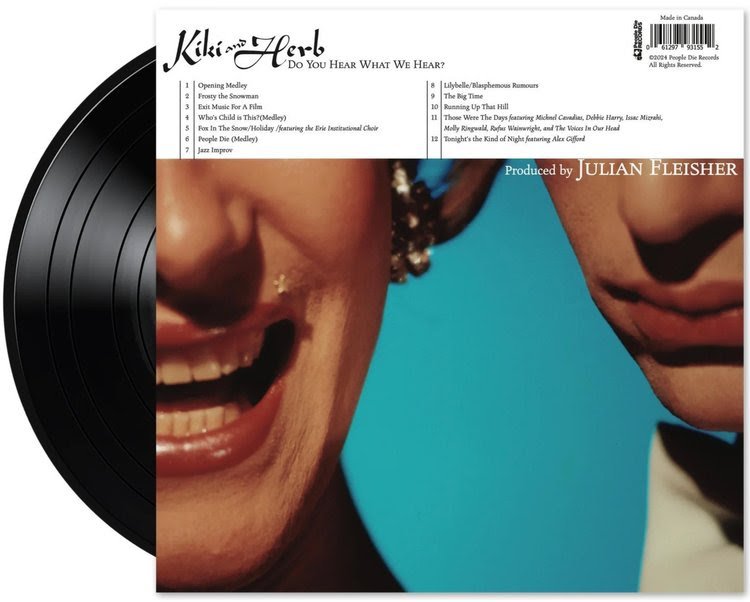
3 never before released live tracks.
Recorded in various boîtes across the world in the 2000s.
Same as it ever was.
All profits go to Black Visions Collective, a Queer and Trans centering organization whose mission is to organize powerful, connected Black communities and dismantle systems of violence…through building strategic campaigns, investing in Black leadership, and engaging in cultural and narrative organizing.
We have covered the cost of the mechanical licenses for the original songwriters and are donating that.
CLICK HERE TO BUY & SUPPORT →
credits
released June 5, 2020
Justin Vivian Bond and Kenny Mellman are Kiki and Herb
Photo by Liz Liguori
Kiki and Herb, in 2003. Photo by Ruven Afanador for The New Yorker.
-
A blood-curdling scream, accompanied by sleigh bells and blustery winds, is your welcome to the tragicomic holiday world of the now-extinct cabaret duo known as Kiki and Herb. Though they stuck around for what seemed like an eternity—perhaps fifty years, perhaps thousands—time was not their friend. It found Herb, a gay Jew on the spectrum, hammering away endlessly at the piano while a soused Kiki stood in front of it, ruminating on life’s absurdities and venting her rage through the songs of the kids—Nirvana, Kate Bush, Depeche Mode, ABBA. Herb chimed in with Tourette-like shrieks and lobotomized mumbles. Christmas, as this album reveals, only made their problems worse.
Whether or not they are, in fact, dead—they’ve surprised us before—Kiki and Herb remain two of cabaret’s greatest creations. We can thank their alter-egos, Justin Vivian Bond and Kenny Mellman, for unleashing them on us in the early ‘90s. Their unhinged punk-rock intensity and free-falling sense of danger riveted a young audience who had never known how exciting cabaret could be. Every show was a cathartic relief, a laugh riot, and a rallying cry to break out the booze and have a ball, no matter how bleak the future seemed.
At first a cult phenomenon, the act kept growing. Kiki and Herb made it to Carnegie Hall (twice), the Sydney Opera House, and Broadway, where they played a Tony-nominated run. They split in 2008, but reunited eight years later for a 22-show stint at Joe’s Pub in New York. The demand for tickets crashed the club’s server.
Do You Hear What We Hear? was first released in 2000. It vanished as fast as your first Merlot at a family Christmas. The album immortalizes a show that Bond and Mellman performed almost every December of their partnership—from their fledgling days at Eichelberger’s, a club in San Francisco, to 2007, when they brought the program to Carnegie Hall for their second concert there. Now this rarity is back—and it is still a feast for anyone whose heart sinks at the thought of one more season of enforced merriment. “It’s Christmas? Okaaaaayy!” moans a resigned Kiki in her cigarette-scarred foghorn voice. The ten-minute Opening Medley is a frantic encapsulation of how the holidays barrel into our lives, dragging us through a blizzard of frozen smiles and saccharin feelgood tunes. Radiohead’s “Creep” (“I’m a weirdo/What the hell am I doing here?”) and Eurythmics’ “You Have Placed a Chill in My Heart” are dropped in as clues to how Christmas is really affecting us. “Ladies and gentlemen,” admits Kiki, “sometimes I feel just like Mary’s donkey. Every finger in the room is pointing at me.” In her slurred autobiographical monologues, every betrayed yuletide dream is dragged out of storage and hung up with the stockings.
The team’s visuals—Kabuki-like facial lines etched in black; Herb’s docile, vacant stare versus the crazed wildcat eyes that would suddenly pop out of Kiki—were a big part of the fun. So was the audience, who egged them on to new heights of pandemonium. It fell to the album’s producer Julian Fleisher—a much-respected singer-songwriter, host, and director on the downtown New York scene—to translate a live experience into sound. What he achieved is as vivid as the best of radio’s golden age. The theramin-like instrument heard in the “What Child Is This?” medley is a saw, played here by its owner, a homeless man whom Fleisher had heard on the street. Its ghostly, off-key wobble helps de-sanctify the birth of Baby Jesus. (The virginal tones at the end come from Debbie Harry.) An all-star chorus (see credits), singing in messy unison, puts us in a pub at last call for “Those Were the Days,” a drunken toast to lost innocence. Mellman has a sweeping grasp of pop styles across time, and he can shift gears in a heartbeat. But we rarely heard him sing a solo as Herb. Fleisher had him do one here on Suede’s “The Big Time,” a song about how fast the spotlight can flicker out, if it ever shines at all. To hear the inner Herb slither out is hair-raising.
Mellman and Bond are clearly not afraid of the dark. Radiohead’s somber “Exit Music (for a Film)” could be the soundtrack for a tiptoed escape from the family house before dawn breaks on Christmas. Marianne Faithfull’s “Times Square,” cowritten with her guitarist Barry Reynolds, goes from chilling to apocalyptic as we envision crowds of holiday shoppers and LED screens showing Santa. “Take a walk around Times Square,” Kiki yowls, “with a pistol in my suitcase and my eye on the TV.”
Amid the chaos is a sweet song by Melanie, “Tonight’s the Kind of Night.” It taps into the pathos that made Kiki and Herb so ultimately touching. Suddenly the decades melt away, and we hear two wounded children, wishing that their Christmas fantasies might actually turn out to be true. ― James Gavin
Running Up That Hill also available on Spotify and Apple Music.
Frosty the Snowman also available on Spotify.






